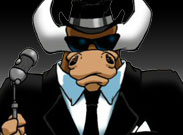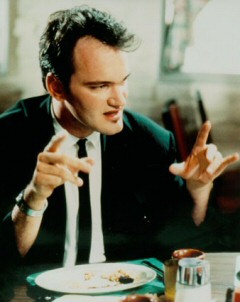Quentin Tarantino
Entertainers Home / Entertainment Channel
One of the most recognizable pop cultural icons of the 90’s, Quentin Tarantino has established himself as a true film auteur with a respected philosophy that places the finished project high above the paycheck. Quoted, mocked and copied to death by almost every media outlet (including “The Simpsons”) over the fifteen years, no one knows how to operate a Xerox machine better than Quentin. Criticized for allegedly stealing word-for-word material and shot-by-shot filmmaking from some of the best in the business, the self-proclaimed film geek certainly knows his movies and doesn’t mind paying homage to them at all with collage-like films reminiscent of a football highlight reel displaying the best plays in the sport. Whether his actions truly do warrant a slap on the hand from the film gods, no man, critic or demon can deny his talent for developing a script filled with shady characters and slick dialogue that the audience can somehow still respect.
Born in 1963 in Knoxville, Tennessee, Quentin’s family moved to Los Angeles when he was only two years old. Named after Burt Reynolds’s character, Quint, in “Gunsmoke,” the future cult director was immersed into the Hollywood culture at a young age, but despite his clear intentions of becoming an actor, Quentin skipped out on film school and got a job as a clerk at the video rental store, Video Archives. Spending his days watching and chatting about movies with customers and friends, Quentin began writing scripts during his spare time. One of Quentin’s very first scripts was for the film “Natural Born Killers,” but after he sold it off to Oliver Stone, the script was reworked into an almost completely new piece and recognized Tarantino with only a small writing credit for the film. After writing and partially filming a reportedly horrible first film (“My Best Friend’s Birthday”), Quentin sold his first screenplay, “True Romance,” for $30,000 and used the cash flow to finance his next film, “Reservoir Dogs.” Through a series of connections from his latest job at CineTel, Quentin was introduced to Harvey Keitel and showed him a rough draft for “Reservoir Dogs,” which he was then convinced to help produce and star in. The film was an instant hit at the 1992 Sundance Film Festival and opened up a door of opportunities for the young hit-maker.
Quentin quickly became the man of the hour, releasing “Pulp Fiction” two years later to even more critical acclaim that landed the director an Academy Award for Best Original Screenplay and a Palme D’Or, the Best Picture Oscar of the Cannes Film Festival, for his adrenaline-pumping story of two hit men. An international hit that revived film noir and realistic dialogue in film virtually overnight, critics and fans alike soon became worried that the director wouldn’t be able to continue his ongoing streak of cinematic masterpieces. In 1997, after a three year break, Quentin released “Jackie Brown, a blaxploitation film starring Pam Grier and Robert Forster that critics ate up, but audiences quickly booed out of theaters. After the quasi-failure of the film, Quentin took a long break from writing and directing, sticking to small acting cameos and promoting the U.S. release of Asian films like “Iron Monkey” and “Chungking Express” before returning to the screen in 2003. Sticking to his guns that his next film would be for himself, Quentin gambled away his career by producing a kung fu film for American audiences. With the release of “Kill Bill,” Quentin and star Uma Thurman were quickly thrust back into the limelight as a Hollywood duo not to be reckoned with. Since the international success of “Kill Bill,” look for Quentin to take over the throne as the King of Cool once again, because as long as Tarantino continues to work in the film industry, Hollywood is safe for a little while longer.
 Tired of striking out? Check out these Dating Tips for all sorts of advice on how to finally get the girl! Also, we tell you all about some of the best online dating sites and how you can use them to hook up with more women!
Tired of striking out? Check out these Dating Tips for all sorts of advice on how to finally get the girl! Also, we tell you all about some of the best online dating sites and how you can use them to hook up with more women!
Quentin On The Web
Quentin on the Screen and Behind the Camera
Quentin may have only directed four films in the past decade, but his omnipresence in the film world has never gone unnoticed, penning some of the best scripts of the 90's and appearing in a number of cameo roles for his Hollywood buddies. Aside from his well-known quintet of directorial stints - "Reservoir Dogs," "Pulp Fiction," "Jackie Brown" and "Kill Bill" - Quentin has proven to many that he can step away from the vulgar language and violence every once, especially after directing and an episode of "ER." Along with the aforementioned directing and writing credits, Quentin also penned the original story for Oliver Stone's "Natural Born Killer's," lent a helping hand on Robert Rodriguez's "From Dusk Til Dawn," wrote one of the four short stories in "Four Rooms" and polished the screenplay for Tony Scott's "True Romance." While Quentin's original Hollywood dream included aspirations to be an actor (his first acting gig was as an Elvis impersonator on an episode of "Golden Girls), most critics relish the chance to mock his untrained performances. Regardless of his talent, Quentin has also always managed to fit himself into every one of his films, and Q's friends haven't shied away from the idea either. Cast by film pal Rodriguez in both "From Dusk Til Dawn" and "Desperado," and by Adam Sandler in "Little Nicky," Tarantino's best performance to date could be seen during his four episode stint as McKenas Cole on the ABC drama, "Alias," during the first three seasons.
Q and His Never-Ending Supply of Film Geek Trivia
On his highly criticized methods:
"I steal from every movie ever made."
On the pressure of matching the success of "Pulp Fiction":
"I don't think there's anything to be afraid of. Failure brings great rewards -- in the life of an artist."
On film:
"I'm telling a story you've seen over and over again. We're going to follow the oldest set-ups in the world, but then we're going to go to the moon."
On making movies:
"Movies are my religion and God is my patron. I'm lucky enough to be in the position where I don't make movies to pay for my pool. When I make a movie, I want it to be everything to me; like I would die for it."
On his sporadic filmmaking:
"I don't need a job... I don't have to work again if I don't want to. So I only make the movies I want to make, when it's fun. Because if you're not gonna have fun, why do it?"








